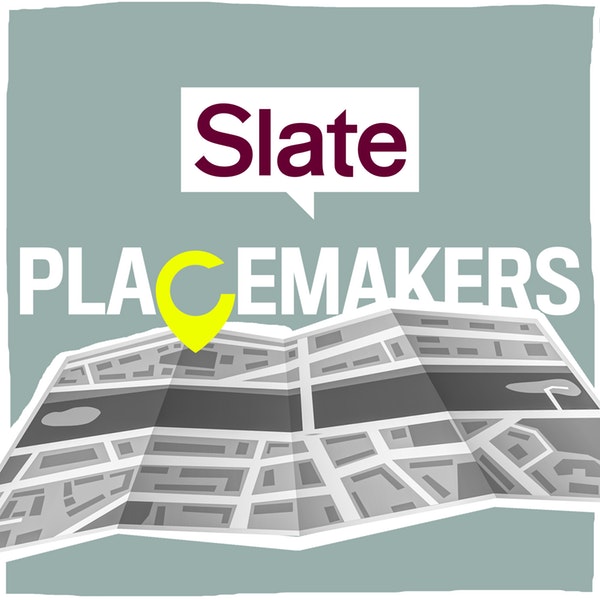

Philadelphia has made a mission of making bike share attractive to low-income and minority residents, trying to buck the national trend of bike-share users being white, rich, educated, and male. The city has moved bike stations into nonwhite neighborhoods. It’s used ambassadors. It’s hired a multiracial team to run the bike-share program. And it’s tried and abandoned other ideas, in an attempt to break the social stigma of riding a bike in poor neighborhoods.
Download episode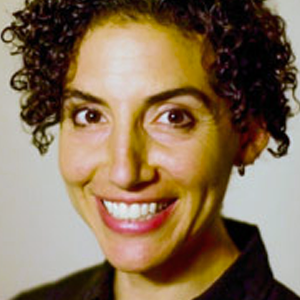
Rebecca Sheir has been a host and reporter on All Things Considered, Morning Edition, Marketplace, Here and Now, The Splendid Table, and the Alaska Public Radio Network. Follow her on Twitter.
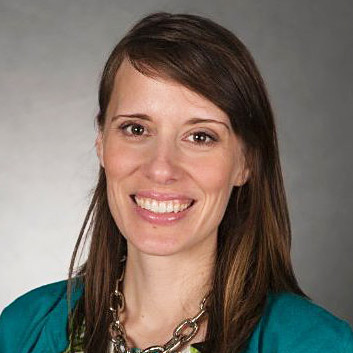
Dianna Douglas is a Placemakers producer. Douglas has completed two tours in Iraq as the NPR bureau chief in Baghdad and as an embed with the U.S. Army in Kandahar. Most recently, she was a reporter at KERA in Dallas.
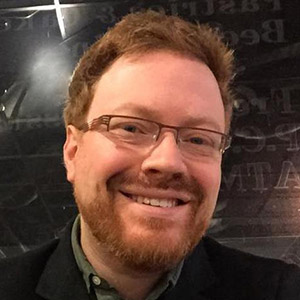
Matthew Schwartz is the Placemakers researcher. He regularly reports for WAMU 88.5 in Washington, D.C., and he won the 2015 national Edward R. Murrow Award for feature reporting in large-market radio. Follow him on Twitter.

Carniesha Kwashie is grant manager for the Better Bike Share Partnership for the city of Philadelphia.
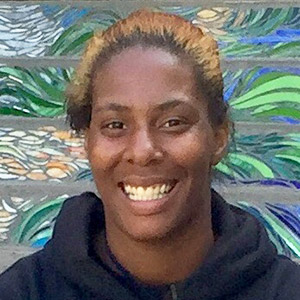
Sway Hill lives in North Philadelphia, where she works as an assistant crew leader with PowerCorps.
Rebecca Sheir: Carniesha Kwashie gets around Philadelphia on a bicycle. She pedals to meetings, her daughter’s preschool, all over town. And when she does, she says she gets quite the enthusiastic response.
Kwashie: I get a “Go, girl!” I get a “Woohoo!,” you know, like they’re so proud of this wonderful, you know, thicker sister on a bike!
Sheir: And not just any bike; a bright blue bikeshare bike. Carniesha says she hopes someday it will be no big deal to see an African American woman riding around on two wheels, especially in Philly.
Kwashie: This is a majority black city. And to me, um, I should see people who look like me.
Sheir: Carniesha actually helped bring bikeshare to the city in 2015. She’s the grant manager of something called the Better Bike Share Partnership: that’s a collaboration The JPB Foundation funds to build equitable and replicable bikeshare systems.
So Carniesha thinks all day long about how to get more people -- especially people who look like her -- to ride Philadephia’s bicycles-for-rent. Not only is biking healthier, and quicker, she says, but it’s far cheaper than getting around in a car. All she needs to do is convince a million-and-a-half people.
I’m Rebecca Sheir. From Slate Magazine, this is Placemakers: stories about the spaces we inhabit, and the people who shape them. Today: Bikeshare programs are popping up in cities across the country. And statistics show they tend to be used by the same kind of people: younger, more affluent, and white. Philadelphia hopes to make its bikeshare system more diverse, and appeal to a much wider population. Placemakers producer Dianna Douglas tells us how.
Dianna Douglas: In April 2015, Philadelphia Mayor Michael Nutter and hundreds of people gathered at the city’s huge Art Museum. They milled about on the steps, once memorialized in the movie “Rocky.” A DJ spun tunes and people danced along. Then the mayor grabbed the microphone and…
Audio of Nutter and crowd: 5, 4, 3, 2, 1! Indego!
Douglas: Everyone hopped on 300 brand new bikes. They are heavy, bright blue, totally distinctive from regular road and mountain bikes. On this inaugural outing, people rode through town and then docked the bikes at dozens of bikeshare stations. Indego, Philly’s bikeshare, was open for business.
If you have no idea what bikeshare is, here’s the concept. You approach a kiosk, rent a bike for a half hour. Ride to the grocery store or to work or wherever. Find another station — maybe with the help of an app on your phone. Park the bike at a dock, walk away, and never worry about it getting stolen or getting a flat tire. The idea started in Europe.
Russell Meddin: I took a trip to France to see a friend in Lyon… the very first thing I saw when I got out of the train station was a Velib, the name of the bike program there.
Douglas: Russell Meddin is one of the godfathers of Indego. He loved bikesharing in France, and wanted it back home. To him, Philadelphia and Lyon are similar – they’re both at the confluence of two rivers, full of universities, beautifully flat. Meddin started pushing for bikeshare in 2006.
Meddin: You have to think about: This is a public service. It is public transportation. In many cities, public transportation is highly subsidized.
Douglas: Back then, though, city hall wasn’t interested. Fast forward 10 years.
Meddin: In the United States, we went from one or two programs in 2010 to now we have over 100 in big and small cities, from Topeka, Kansas to New York. Soon to be Los Angeles, soon to be Richmond, Virginia; Baltimore, Maryland; New Orleans; Baton Rouge.
Douglas: This connection to Europe has been great for the image of bikeshares. Squint your eyes, and maybe you’re in Amsterdam instead of Topeka, riding a stylish, heavy Dutch bicycle. But that same image has also been bikeshare’s weakness.
Gabe Klein: What you’re seeing with bikeshare, -- is that it is the early adopters, that use it first often -- yeah, young, white males.
Douglas: Gabe Klein created Capital Bikeshare in DC – it’s the nation’s most successful bikeshare. Here’s the problem. In DC — a city that’s half black — only three percent of bikeshare users were black, according to a 2013 survey. Most of the riders were wealthy. Bikeshare is usually paid for with a combination of public and private money, so it doesn’t seem right that the benefits are only going to one already-privileged group. Klein also brought bikeshare to Chicago. Initially, the bike stations were concentrated in affluent, mostly white neighborhoods.
Klein: I think we stigmatize transportation in the United States. We’ve said, Okay, the bus is for poor people. The rail, well, that’s acceptable for wealthier people. The car is a real status symbol.
Douglas: And the status of bikes? Still to be determined as a public transit option.
When Philly started looking in earnest at starting a bikeshare program, they wanted to do better.
Kwashie: You need different voices in the room with different perspectives. You can’t just talk about diversity and inclusion.
Douglas: That’s where Carniesha Kwashie comes in. She joined the mayor’s office in Philadelphia in 2014 with a specific assignment: make bikeshare accessible and appealing to low-income people and to minorities.
Kwashie: Don’t just hire me on a team and not allow me to make decisions or have the power to make a decision.
Douglas: Now stop for a second and think about how you would do this, if this were your job. How would you reach low-income people or minorities in your city to get them to ride shared bicycles? Carniesha Kwashie had a philosophy for how to influence people: find people who are trusted in these communities, and get them to do the convincing.
Kwashie: I’m not a transportation person, so when I came in I was like, “Who are our partners?”
Douglas: At Indego, she says she got blank stares.
Kwashie: Because relationships, I don’t care what project you’re working on, relationships are key. They’re everything.
Douglas: So before Indego launched, Kwashie had hundreds of meetings with people who work in low-income and minority communities — soup kitchens and churches and programs for at-risk young people and adult literacy programs.
Kwashie: I don’t go in talking about, “You’re going to love this new fantastic public transportation option,” because I’m here telling you about it. I go in very humble. I go in and let them lead me and tell me where the conversation’s going to go, because I’m on their turf.
Douglas: With her staff, on her turf, she’s more forceful. One of her first acts in the mayor’s office was to make everyone on her team volunteer during a day of service. Get out of city hall and meet some of the people that they were trying to reach.
Kwashie: I have certainly worked on teams where I may be the only person of color, maybe the only female, maybe the only one who comes from a working class background. I believe that in order for us to provide really great service, we have to understand who we are and where we come from.
Douglas: Kwashie knew that the critical work had to happen before the official launch. In the months before any Indego bikes appeared on the city streets, she pushed hard for her bosses to hire more people of color.
Next, she gave away hundreds of free memberships. She hired community leaders in poor neighborhoods, called them “ambassadors,” and paid them to take their friends on group rides. The ambassador tactic is common in public health—say, for instance an NGO wants to get prostitutes in Nairobi to use condoms. They’ll give them to social leaders and use peer pressure. Kwashie bet this idea could work for bikes.
Then, she found an Americorps program that was doing job training for high school dropouts and people coming out of prison, called Powercorps. Kwashie gave everyone in the program, about 80 people, a free trial membership. She also led group rides for the Powercorps staff – a rolling staff meeting.
And she arranged a way for people to rent bikes without a credit card. Now, Philly is the only city where people can pay for bikeshare with cash.
Kwashie: Transportation is so expensive when you’re lower income, or living in poverty, that it creates a bigger barrier sometimes than I think people recognize and understand.
Douglas: Many of the people Kwashie had been cultivating showed up to the launch party to ride bikes with the mayor, on that chilly day in April 2015. Mayor Nutter also stuck to the script: that bikeshare was for everyone.
Nutter: We’ve spent the last few years--more than a few years--planning and building low-cost, easily accessible, public transportation system that can serve so many diverse communities all across the city of Philadelphia.
Douglas: A month after Indego’s launch, the city compiled data on the people who had tried bikeshare. Twenty-one percent were low-income.
Sheir: To an extent, the City of Brotherly Love has succeeded in getting less privileged residents to try Indego — but it still has a long way to go. After the break, we’ll hear why.
Sheir: From Slate Magazine, it’s Placemakers. I’m Rebecca Sheir. Today, we’re visiting Philadelphia, to hear how the city is trying to crack the code on making its bikeshare system, Indego, more accessible and appealing to low-income and minority residents. Dianna Douglas picks up our story.
Dianna Douglas: I’m in a van with Tray Duffy, one of the people in charge of “balancing” the bikeshare system in Philadelphia. We drive between bike stations, taking bikes from full stations and docking them at empty stations.
Duffy: If you want to rent a bike, of course, it’s not good if you go to a station and it’s empty because you can’t rent it. But it’s even worse if you have a bike that you’ve rented, that you’re on the clock with, and you go to a station that’s full and you can’t drop your bike off.
Douglas: Duffy drives a lot around Center City. It’s a dense, wealthy neighborhood in the heart of Philly where most of the bike stations are, and where the busiest stations are.
Duffy: So that’s Race Street there, and this is 6th, and there’s another one just one block that way. Independence Mall. This one gets pretty good use. It’s a busy one.
Douglas: In the mornings, he has to empty out the station at the Children’s Hospital of Philadelphia multiple times. In the evenings, he brings bikes there multiple times. Lots of commuters, who don’t want to scramble for a bike or for a place to park it. Currently about a third of Indego’s docking stations are in low-income, and primarily non-white, neighborhoods.
Duffy: So I was like, man I’ve got all these stations I’ve got to learn, I don’t know all these streets, I’ve heard of these streets but I’ve never been on Tasker before.
Douglas: I’ve been on Tasker Street, actually. It’s in Point Breeze, down on Philly’s south side, a much different neighborhood from where Duffy spends most of his time shuttling bikes. He doesn’t travel to Tasker Street too often, because it’s one of the lesser used stations in the system. In fact, the least-trafficked bikeshare docks in Philly are those in low-income, non-white neighborhoods.
Carniesha Kwashie, grant manager in the mayor’s office, has had a couple of years now to try and make bikeshare more popular in these places. One of her foot soldiers was Anton Moore, a bikeshare ambassador.
Moore: It was like this big mystery behind these bikes. You see these blue bikes riding thru your community. You see the bike stations all over. People want to know, how much is it? Then people were coming up with their own theories: “Oh you paid $30 a day to ride that?”
Douglas: Moore is a real presence in the Point Breeze neighborhood. He runs a non-profit called Unity in the Community. It tries to keep young people from getting caught up in gun violence.
Anton: Hi, how you doing!
Douglas: We rode around his neighborhood, and he knew everyone.
Anton: How you been?
Douglas: But when his year as an Indego ambassador was up, and the blue bikes were no longer free for him, Moore didn’t buy a membership. He told me it was too expensive.
Moore: You have families out there who unfortunately can’t afford $15 a month.
Douglas: Actually, the mayor’s office asked hundreds of low-income people how much they would be willing to pay for a monthly pass. The average answer? Five dollars. So, that’s how much it costs now for the very poor. Anton Moore falls in that huge category of people who aren’t on public assistance, and therefore don’t qualify for the five-dollar-a-month rate -- but who are also watching their wallets.
So here’s something that completely floored me: The U.S. Census found that most bike commuters are actually poor and minorities. Biking is definitely the cheapest way to get to and from a job, or at least to and from public transportation. If you use bikeshare in Philly, we’re talking 50 cents a day if you pay full price, or pennies a day if you’re low-income.
But there’s a crucial difference between someone riding a bike to a work site because it’s his only way of getting there, and someone who chooses to leave his car at home and cruise around his neighborhood on a steel Dutch bicycle. In poor neighborhoods, riding a bike is a signal that you don’t have a car.
Anton Moore told me how embarrassing it is to be caught on a bike that breaks down. And how vulnerable he feels.
Moore: I don’t have the patience for fixing a bike, or hauling it down the street. It did it one time. It was the most humiliating thing in the world. You are walking, and it is hot outside, and as you are walking the bike, people are riding by, like, “Is there anything I can do to help you?” Just keep moving; I’m just like, “Never again.”
Douglas: Back at the Mayor’s office, Carniesha Kwashie knows this — that biking has an image problem among poor people. It’s true in Beijing and Delhi and Manila, too. She just wants bikeshare to be in a different category in people’s minds.
Kwashie: I really hope that, in particular with bike share, that folks won’t say that’s something that I need to ride because I can’t afford a car.
Douglas: Kwashie says she’s never had a driver’s license. She has trains, busses, bikes, walking, Uber and Lyft, taxis — many choices for how to get around. She wants everyone in Philly to feel this same freedom of movement. She wants to open every part of the city up to everyone, and feels like maybe bike share can do it.
Kwashie: My grandmother, and grandfather, and family members, they grew up in an America where they were taught what they could and could not do. I grew up in that same America too, but what they raised me to believe is to disbelieve that I could not do something just because I’m black.
Douglas: On my last trip to Philly from Washington to visit Kwashie, I instinctively checked Google Maps for the best route. From the Amtrak station, it was faster to bike than to drive. So, I walked past the line of taxis to an Indego kiosk, paid four dollars, and hopped on a bike.
Sheir: These days, Atlanta, Los Angeles, Chicago, even New York - they’re all looking to Philadelphia to see how they can reach into lower-income neighborhoods and open people’s hearts to bikeshare. And Carneshia Kwashie has handed out grant money from the JPB Foundation to cities trying to attract lower-income riders.
But when it comes to funding, she says, in Philly, Indego isn’t really about getting a return on investment. A quarter of the program’s operating costs are covered by its sponsor: Independence Blue Cross. In fact, that’s where Indego gets its name: Independence – Indego – Get it?
Anyway, member revenue takes care of the other three-quarters of Indego’s operating costs. So it isn’t like Indego needs these riders to keep the system afloat. It just wants them, so that the people pedaling on Indego’s two-wheels truly represent one city.
Our story today was reported by Dianna Douglas. Placemakers is a production of Slate Magazine and is produced by Mia Lobel, Dianna Douglas and Michael Vuolo, and edited by Julia Barton. Our researcher is Matthew Schwartz. Eric Shimelonis does our mixing and musical scoring. Our theme was composed by Robin Hilton. Steve Lickteig is our executive producer. I’m Rebecca Sheir.
For more information about today’s show and other episodes of Placemakers, go to slate.com/placemakers. You can drop us a line at placemakers@slate.com. And follow us on Twitter; our handle is @SlatePlacemaker. And if you like what you hear, please take a moment and give us a rating or review on iTunes. It really does help.
Coming up next time on Placemakers: Residents of the U.S. Capital call her “The Warrior on the Hill.” See if you can guess why.
Eleanor Holmes Norton: I will not yield, sir! The District of Columbia has spent 206 years yielding!
Sheir: Eleanor Holmes Norton is the District of Columbia’s representative in Congress. She doesn’t have a vote, but she does have a fight: to win statehood for the 670-thousand people of Washington, DC.
Hey, you still here? If so, we have an extra added bonus for you this week: a little piece from our own Matthew Schwartz, who took a bike ride with a mom in Philadelphia who doesn’t just enjoy Indego; she goes out of her way to use it.
Schwartz: It’s just after 6 am when I arrive at the apartment of Sway Hill in North Philly. We’re about to begin a multi-modal odyssey to get to work, which includes a walk, a bus, another bus, bikeshare, and another bus. First stop? Picking up milk for her kids.
Boy (singing): I got, got, chocolate milk! I got, got, chocolate milk...
Schwartz: That’s a good song.
Boy: Got, got, got – huh?
Schwartz: That’s a good song. You make that up?
Boy: Yes.
Schwartz: It’s quite a process for Hill, getting her three kids ready, taking them to daycare, and then making it to her first of two jobs that she’ll work today. Her commute takes an hour, sometimes an hour and a half.
Hill: Ready to get off the bus?
Boy: Bananas!
Schwartz: We pick up breakfast for the kids--
Schwartz: You’re going to get them a banana?
Hill: Yeah, we do this every day.
Schwartz: Finally, after a bus ride and a walk of several blocks, we drop them off at daycare.
Hill: Bye bye, Brooklyn.
Schwartz: Bye bye!
Schwartz: Hill is a single mother with two jobs. Job number one is with PowerCorps, doing landscaping work at sites throughout the city. Then it’s on to her next job.
Hill: Like, today, I get off at Powercore at four thirty and I have to be at the stadium at five.
Schwartz: What do you do at the stadium?
Hill: I work for the recycling center.
Schwartz: Oh, okay.
Hill: Yeah. Everybody brings all their trash down from all around the stadium and the parking lots and then we sort it and get all the cans…
Schwartz: We take the bus a few more stops, to the nearest Indego station with two bikes available. It turns out, Hill doesn’t have to ride Indego bike share to work. It doesn’t save her any time. She could take buses the entire way. She’s essentially following the bus route on her Indego bike.
But this — this half hour between when she drops the kids off and when she bikes to the first of two her jobs — this is her time. It’s her only time, really, to have fun. She does this every morning.
Hill: If I don’t get exercise and eat some type of fruit, I’ll be walking around at work, tired. This building right next to us, over here on the right side, it’s called “Achieving Independence Center.”
Schwartz: That’s an organization that helps people in foster care. Hill knows it because she’s been in foster care. She hasn’t had the easiest life. She’s gotten in trouble with the juvenile justice system. But now she’s working, she’s got a nice place, some adorable kids. And Indego is a part of what helps keep her life together. In fact, Hill loves Indego so much, that she entered an essay contest. It asked, “What does Indego mean to you?” And she won.
Hill: Now, if I’m not mistaken, two blocks up, someone told me there’s a billboard with my picture on it.
Schwartz: Hill actually won the contest months ago, but she’s never seen her prize: an Indego kiosk with her face on it. She’s pretty excited.
Hill: Oh, I see it! Over there. I’m ready to upload some pictures, tell everybody on Facebook.
Schwartz: And in Hill’s community, word of mouth is important.
Schwartz: You said you have a lot of friends on welfare-
Hill: Yeah.
Schwartz: Do they use bike share?
Hill: Yes, only because I told them. People see the bikes but they don’t know what these are. People be like, “How you get on that bike? How you get that?” People always ask me, “How you get that bike?”
Schwartz: Walking up to a government-created bike kiosk and reading instructions just isn’t done in this neighborhood.
Schwartz: You say they don’t want to walk up and look and read? Why? Is that like a dorky thing?
Hill: Probably for them. Not for me.
Schwartz: It’s like a social stigma.
Hill: Yeah. “What are you doing over there?”
Schwartz: After posting pictures, we keep riding, just a little longer. Eventually, Hill will take another bus to PowerCorps, where she’ll spend eight hours landscaping — and then another bus to the recycling center where she’ll spend hours sorting through trash. In the morning, she’ll start all over again, taking the kids out for bananas and then school. But for now, it’s just Hill and her bike.
Schwartz: That was fun! So you got your exercise out of the way.
Hill: I’ve got my fruit in my bag. Now when I get to work I’m energized.
Schwartz: What was it like before bike share?
Sway (mopey): “Good morning everybody.”